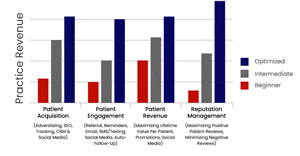What is the difference between a Functional vs Holistic vs Integrative medicine
Holistic Medicine is about overall well-being and finding balance in all aspects of life. Integrative Medicine blends traditional medicine with complementary therapies to address both symptoms and the root causes of illness. Functional Medicine delves deeper into understanding the underlying mechanisms of illness through testing and treating the root causes, often using a combination of natural and conventional treatments.
Key Differences in Approach
| Aspect | Holistic Medicine | Integrative Medicine | Functional Medicine |
|---|---|---|---|
| Focus | Treats the whole person through natural methods and lifestyle. | Combines conventional medicine with complementary therapies. | Identifies and addresses root causes of disease using lab tests. |
| Treatment Approach | Mind-body therapies, herbal remedies, diet changes. | Traditional medical treatments combined with alternative therapies like acupuncture, massage. | Uses scientific tests to identify system imbalances and targets treatment. |
| Patient Role | Active in their spiritual, emotional, and physical healing. | Collaborates with medical professionals to decide on a treatment plan. | Works with the patient to implement personalized health plans based on lab results. |
| Key Goal | Promote overall balance and wellness. | Integrate modern science and traditional healing methods. | Restoring optimal body function and balance. |
| Common Conditions Treated | Stress, anxiety, chronic pain, sleep issues, and wellness. | Chronic pain, cancer care, mental health, autoimmune diseases. | Chronic conditions like autoimmune diseases, hormonal imbalances, and gut disorders. |
| Examples | Yoga for anxiety, acupuncture for stress, herbal remedies for chronic pain. | Combining medication with chiropractic care, acupuncture, or diet counseling. | Testing for food sensitivities, managing gut health, supplementing vitamins for thyroid disease. |
The terms holistic medicine, integrative medicine, and functional medicine are often used interchangeably, but they have distinct approaches to healthcare. Let’s dive deeper into each one with more examples to clarify their differences and show how each works in real-life scenarios.
1. Holistic Medicine
Definition:
Holistic medicine emphasizes the treatment of the whole person—not just the physical symptoms or disease but the emotional, mental, and spiritual well-being. It focuses on maintaining balance and wellness through a variety of natural and alternative therapies.
Example 1: Chronic Stress and Anxiety Treatment
A patient suffering from chronic stress and anxiety might visit a holistic practitioner. Instead of focusing on medication alone, the practitioner would likely recommend a combination of treatments:
- Yoga and meditation for mental relaxation
- Herbal remedies like chamomile or ashwagandha to support emotional balance
- Nutritional advice to enhance overall health and reduce stressors, such as incorporating more magnesium-rich foods like spinach and nuts
- Aromatherapy with essential oils like lavender to calm the nervous system
This approach addresses the emotional and physical causes of stress rather than just suppressing anxiety symptoms.
Example 2: Treating Chronic Pain with Lifestyle Changes
For a patient with chronic back pain, a holistic approach might involve:
- Massage therapy to relieve tension in muscles
- Acupuncture to unblock energy and promote healing
- Mind-body therapies such as mindfulness to manage the pain emotionally
- Dietary adjustments like increasing anti-inflammatory foods such as turmeric, omega-3 fatty acids, and leafy greens
By treating the mind and body together, holistic medicine helps to reduce both the physical pain and emotional distress the patient experiences.
2. Integrative Medicine
Definition:
Integrative medicine combines conventional medical treatments (like drugs and surgery) with complementary therapies (such as acupuncture, massage, and nutrition). It focuses on healing the whole person by merging traditional medicine with alternative practices.
Example 1: Cancer Treatment Support
An integrative oncology clinic might work with a cancer patient who is undergoing chemotherapy. The conventional treatment (chemotherapy) addresses the cancer itself, while integrative approaches support the overall well-being and improve the quality of life during the treatment process:
- Acupuncture to reduce the side effects of chemotherapy, such as nausea and fatigue
- Nutrition counseling to boost immune function and help manage side effects
- Mind-body therapies, like guided imagery, to help reduce anxiety and support emotional well-being
- Herbal supplements to help the body detox and support energy levels (under the supervision of a licensed practitioner)
This team-based approach helps manage the disease and improve the patient’s physical, emotional, and mental state without completely rejecting traditional treatments.
Example 2: Chronic Migraines
A patient with chronic migraines may visit an integrative medicine practice to explore a combination of conventional and complementary therapies. They might receive:
- Prescribed medication from a doctor to reduce the frequency or severity of the migraines
- Chiropractic adjustments to address musculoskeletal issues contributing to headaches
- Acupuncture sessions to relieve pain and prevent future migraines
- Nutritional counseling to identify potential food triggers, such as caffeine or gluten
- Stress management techniques like yoga or mindfulness to reduce emotional triggers
Integrative medicine focuses on using both traditional medical treatments and natural healing methods to help the patient achieve a more balanced and effective outcome.
3. Functional Medicine
Definition:
Functional medicine takes a deep dive into the root causes of illness by using comprehensive lab tests and a systems-based approach to understand how genetic, environmental, and lifestyle factors contribute to health. The goal is to identify imbalance and dysfunction in the body’s systems (like the gut, hormones, or immune system) and then address these with targeted treatments.
Example 1: Treating Hormonal Imbalance
A patient experiencing chronic fatigue, weight gain, and mood swings may visit a functional medicine doctor. Instead of simply prescribing antidepressants or hormone replacement therapy, the functional medicine doctor will investigate the root cause through:
- Blood tests to measure hormone levels, blood sugar, and thyroid function
- Gut health testing to evaluate potential imbalances in the microbiome that could be contributing to hormonal dysregulation
- Nutritional advice to optimize nutrient intake, focusing on foods that support hormone balance (e.g., omega-3 fatty acids, zinc, and magnesium-rich foods)
- Lifestyle changes such as improving sleep hygiene, reducing stress through mindfulness, and engaging in regular exercise
Functional medicine seeks to correct imbalances at the biological level, providing a personalized treatment plan based on lab findings.
Example 2: Autoimmune Disease Management
A patient diagnosed with an autoimmune disease such as Hashimoto’s thyroiditis may see a functional medicine doctor. The practitioner will:
- Use advanced lab testing to measure thyroid function, inflammation markers, and nutrient deficiencies
- Review the patient’s diet to identify any foods that may be triggering the autoimmune response (e.g., gluten or dairy)
- Recommend specific supplements (such as vitamin D, selenium, and probiotics) to address deficiencies and support immune function
- Focus on reducing inflammation through anti-inflammatory foods and lifestyle changes such as stress management
The functional medicine approach aims to not just treat symptoms, but address the underlying dysfunctions that lead to the autoimmune condition.
Conclusion:
Each of these approaches—holistic medicine, integrative medicine, and functional medicine—offers a unique way of treating patients. Holistic medicine seeks to balance the mind, body, and spirit using natural methods, while integrative medicine combines traditional and complementary treatments for a comprehensive healing approach. Functional medicine, on the other hand, focuses on understanding and addressing the root causes of disease through advanced testing and personalized therapies. In practice, many people choose to combine elements of all three approaches based on their specific needs, as each method brings valuable perspectives to health and healing.
As a provider for holistic medicine, integrative medicine, and functional medicine, if you need any assistance with patient acquisition, please contact us.


